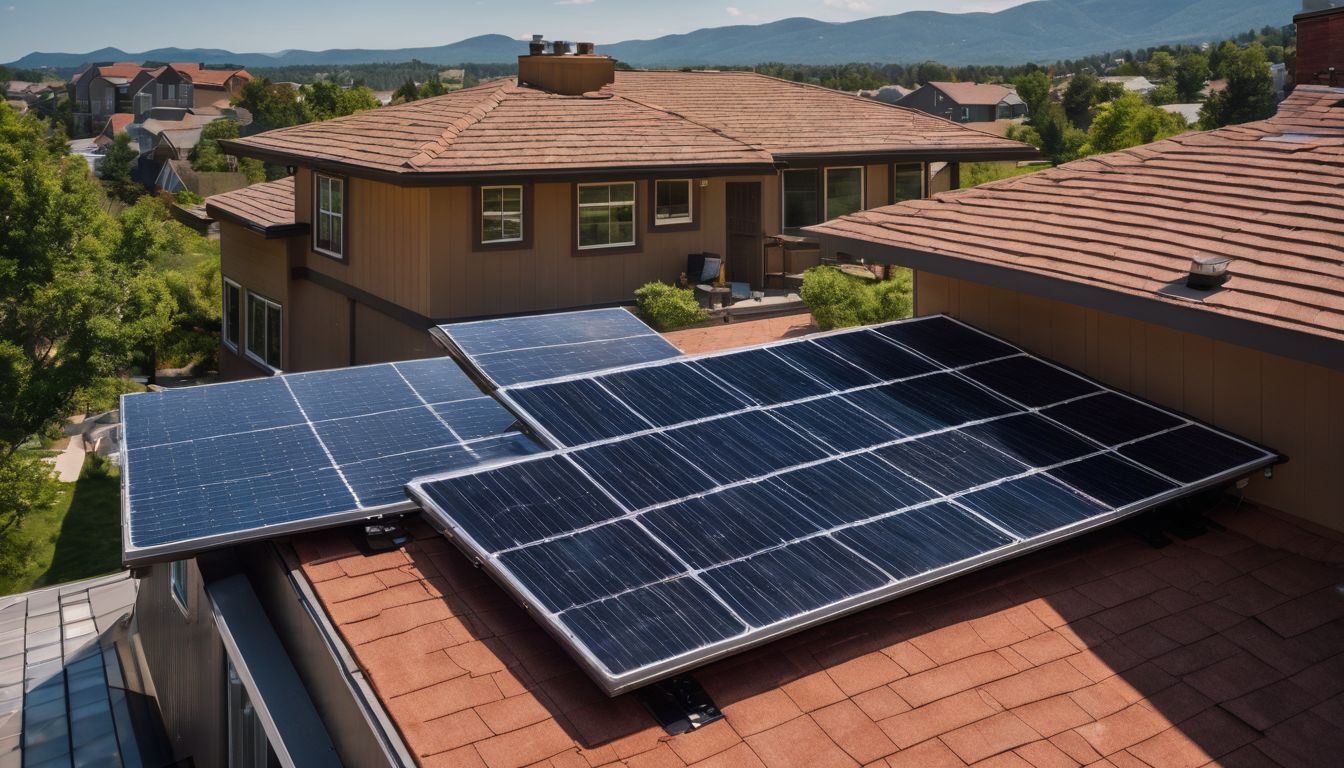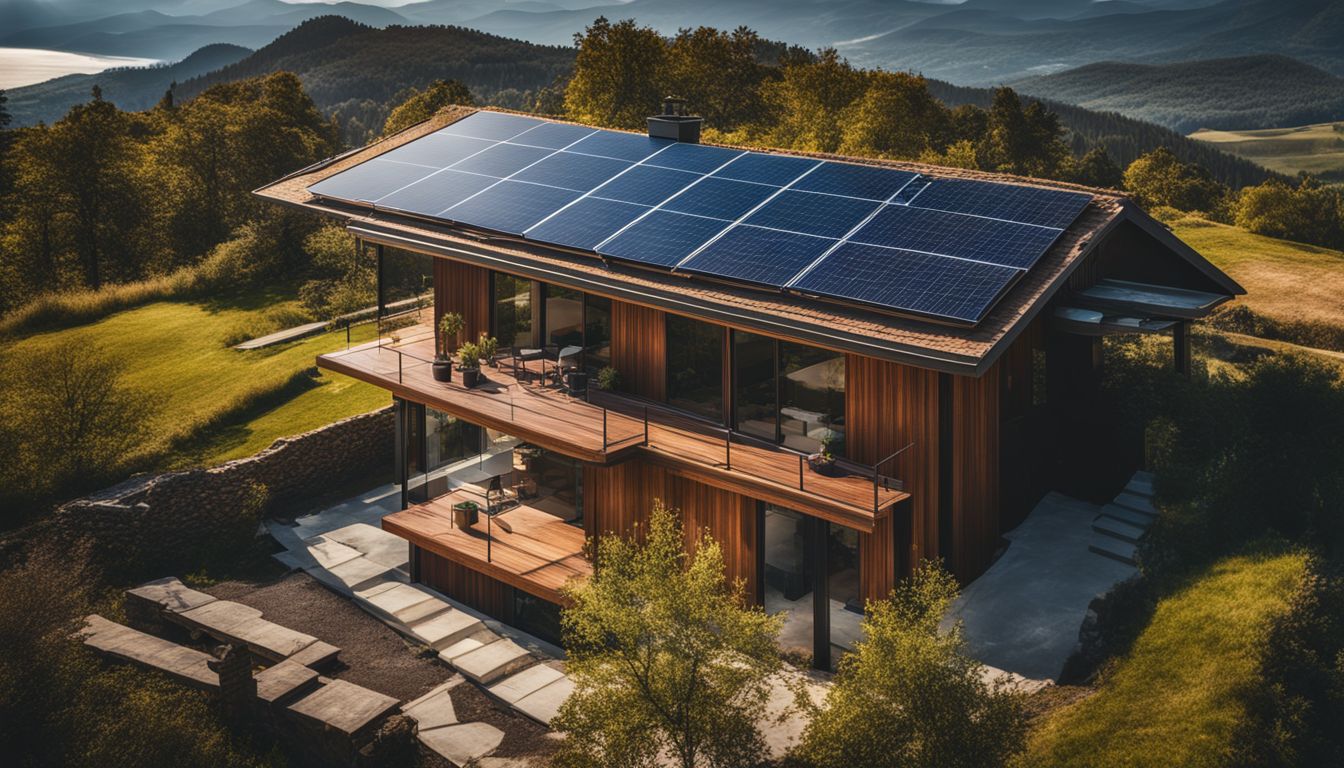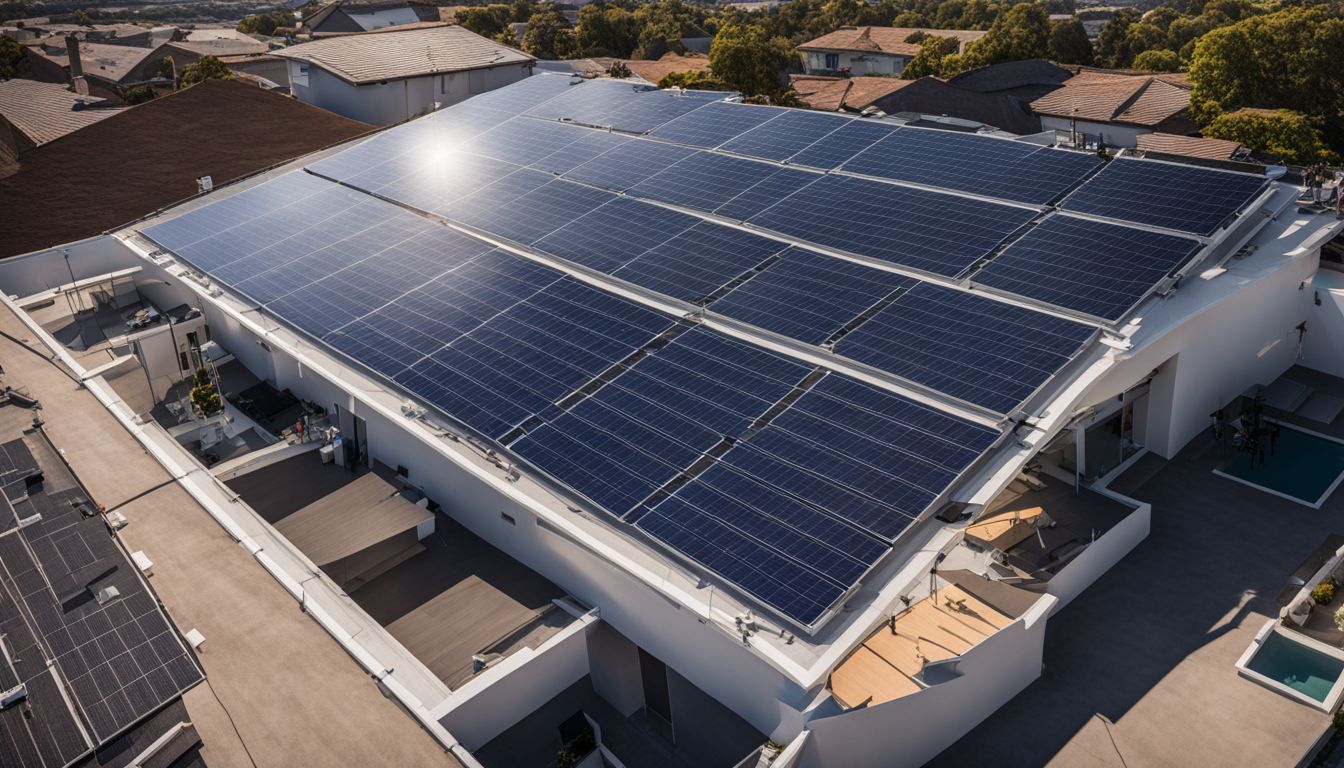Can two solar panels power a house?

As homeowners search for ways to cut energy costs, the question arises: can a mere two solar panels fuel an entire house? Surprisingly, it is indeed possible, though highly dependent on specific factors.
This blog post will delve into what's required and how these clean energy dynamos could support your home's power needs. Read on to find out if a duo of solar panels can be your green dream come true!
Key Takeaways
- The number of solar panels needed depends on your home’s energy use and the amount of sunlight it gets. You might need more if you use a lot of power or have less sun.
- While two solar panels may not be enough for all homes, they can still help cut down on electricity bills and run some small devices.
- Bigger houses usually need more panels than smaller ones because they use more energy to keep lights and appliances working.
- Knowing how much energy things in your house need helps you work out how many solar panels you should get.
- If you make more power than you use, batteries can store it, or sometimes you can sell the extra back to the electricity grid.
Understanding Solar Panels and How They Power a House

Solar panels come in various sizes and wattages, with their output efficiency determining how much power they can generate. The size of your solar panel system will depend on the energy requirements of your home, the amount of sunlight in your area, and the size of your household.
https://www.youtube.com/watch?v=EX2vB472PJA
Solar Panel Size
The size of the solar panel matters when you're looking to power your home. Think of panels as the workers that catch sunlight and turn it into energy for you to use. Bigger panels can grab more sun, which means they can make more power.
Most house panels are between 250 watts and 400 watts. Imagine that a single panel is like a big piece of toast; larger ones are like adding an extra slice or two.
The space on your roof decides how many slices—I mean, panels—you can have up there. You'll need enough room if you want lots of power. But don't worry, even if space is tight, connecting lots of these 'toast slices' together makes a bigger'sandwich' that powers more stuff in your house!
Solar Panel Wattage
Wattage tells us how strong a solar panel is. Most home solar panels have a power rating of 250 to 400 watts. This number is key because it helps figure out how much electricity your panels will make.More watts means more power, and that can mean fewer panels on your roof.
The wattage also affects the cost and size of your solar setup. Higher-wattage panels might cost more, but you'll need fewer of them. It's like buying bulbs for your house—stronger bulbs light up a room with fewer lights needed! So, choosing the right wattage helps meet energy goals without taking up too much space or costing too much money.
Output Efficiency
Output efficiency is a big deal for solar panels. It tells you how good they are at turning sunlight into electricity. Think of it like a game: the higher the score (or efficiency), the better your solar panel plays in making power.Most panels grab 17–22% of the sun's energy that hits them, which is pretty cool.
Now, not all solar panels are made equal. Some are super stars and can make more electricity because their efficiency is top-notch, around 15% to 20%. This means if you have one square meter of a panel with around 350 watts—boom!—you get about 60 watts out of it when the sun is shining bright.
The better this number gets, the fewer panels you need on your roof to keep your lights and TV running.
Factors That Determine the Number of Solar Panels Required

When determining the number of solar panels needed to power a house, several factors come into play. These include your home’s electricity usage, the amount of sunlight and climate in your area, the size and layout of your home, as well as your budget for installing solar panels.
https://www.youtube.com/watch?v=pCoTa3sg_us
Your Home’s Electricity Usage
Every house is different when it comes to how much electricity it uses. You might use a lot of power if you have big machines or keep your lights on all the time. Or maybe you don't use as much because you're careful and only have small things that need power.
To figure out how many solar panels you need, start by looking at your energy bills over the year. This will show you how many kilowatt-hours (kWh) of electric energy your home consumes each month.
Think about everything in your house that uses electricity, like the fridge, TV, computer, and even hair dryers. They all add up! If you want solar panels to be the main source of power for your place, knowing this total number helps a lot.
It tells us if two solar panels are enough or if we'll need more to keep everything running without trouble. Remember, using less energy means fewer panels are needed, so being smart with electricity can help both our planet and our pockets!
Sunlight and Climate In Your Area
The sun gives us the power we can use in our homes. But not all places get the same amount of sunlight. Some have long, sunny days, while others have more clouds and rain. This changes how many solar panels you need for your house.
If your home gets lots of sunlight, you might not need as many panels.
Climate matters too because it changes how well solar panels work. Cold weather can make them better at turning light into power, but if it’s too hot, they may not work as well. Also, big trees or buildings that block the sun will mean you need more panels to catch enough light.
So, look around your house and see what's blocking the sun, and think about your weather when choosing solar power.
Size of Your Home
Bigger homes often need more solar panels. This is because there's usually more space to heat or cool and more gadgets that use power. Think about how many rooms you have, plus stuff like TVs and fridges that need electricity all the time.
Smaller houses might be okay with fewer panels. They have less area to keep warm or cold, which means they use less energy. If your home has good insulation or if you're great at saving power, you might not need as many panels either.
Budget
Money matters a lot when you want to switch to solar energy. The cost of buying and installing solar panels can be high. You must think about how much money you have for this project.
Solar panel costs can change depending on the kind you get and where you live.
For an average U.S. home, it might take between 15 and 19 solar panels to cut your electricity bill. In places like South Africa, homes might need up to 23 big panels for more power if they use lots of electricity.
Tax credits and energy savings over time can help make your investment cheaper in the long run.
Can two solar panels power a house?
The number of solar panels needed to power a house depends on the desired energy production and the wattage of the solar panels. By calculating the ratio between these two factors, you can determine how many solar panels are required to meet your home's electricity needs.
https://www.youtube.com/watch?v=bzcTFUcXwIY
Desired energy production (kW)/solar panel wattage (kW) = Number of solar panels needed
To determine the number of solar panels needed, divide the desired energy production (in kW) by the solar panel wattage (in kW). For instance, for a 5kW desired energy production and 0.3kW solar panel wattage, you would need around 17 panels.
The average British home needs between 15 and 19 solar panels based on an average electricity usage of 893 kilowatt-hours (kWh) per month; it’s likely more than two will be required to power a whole house.
Generating up to 17 kWh of energy requires a sizable system—roughly six to seven kW with about fifteen rooftop panels. To ensure adequate coverage, aiming for nearly four-fifths of your current power usage is recommended when determining how many solar panels are needed.
How Solar Panels Can Run Your Whole House
Yes, solar panels can power an entire house. The number of panels needed depends on the household's energy needs and the panel's wattage. A typical British home requires 15 to 19 solar panels for its monthly electricity usage.
To go completely off-grid, considerable investment in time and money is necessary. It is crucial to ensure that your electrical system is fully compatible with enough solar panels for your annual energy needs.
The technical features and considerations of solar panels must be understood before equipping a home with them. Calculators are available to determine the required number of solar panels based on a specific home size and energy usage.
Solar panels have the potential to run a house off-grid, but the specific number of needed panels hinges on the household's energy requirements.
Solar Panel Requirements for Various Household Appliances
Household appliances vary widely in their energy consumption, which directly affects the number of solar panels required to keep them running. Here's a table detailing the solar panel requirements for various common appliances:
| Appliance | Approximate Wattage | Average Daily Usage (Hours) | Energy Consumption per Day (kWh) | Estimated Solar Panels Needed* |
|---|---|---|---|---|
| Refrigerator | 100-800 | 24 | 2.4-19.2 | 1-5 |
| Air Conditioner | 500-1500 | 3-5 | 1.5-7.5 | 1-4 |
| Electric Water Heater | 3000-4500 | 3 | 9-13.5 | 5-7 |
| Washing Machine | 500-1000 | 1 | 0.5-1 | 1 |
| Dishwasher | 1200-1500 | 1 | 1.2-1.5 | 1 |
| Laptop | 50-100 | 4 | 0.2-0.4 | <1 |
| LED Light Bulb | 10 | 5 | 0.05 | <1 |
| Television | 100-400 | 4 | 0.4-1.6 | 1 |
*Calculations assume a solar panel efficiency of 250 watts per panel and average sunlight of 4 hours per day. The number of panels can vary depending on specific panel efficiency and locational sunlight availability.
The figures in the table provide a rough estimate. Actual calculations will depend on the precise wattage of your appliances and the total energy usage. Computing the requirements for each appliance helps gauge the feasibility of powering your home with solar energy, including the possibility of doing so with just two panels. It becomes evident that in most cases, a pair of panels won't suffice for the entire home but can contribute significantly to the energy needs of smaller, specific appliances.
How to Calculate the Number of Solar Panels Required to Power Your Home
To figure out the number of solar panels you need for your home:
- Calculate your hourly energy requirement.
- Multiply this by the peak sunlight hours for your area to determine daily energy production.
- Divide the total daily energy production by the capacity of each solar panel to get the number needed.
Other Ways to Calculate the Number of Solar Panels You Need
- Hourly Energy Requirement Calculation: Multiply your household's hourly energy requirement by the peak sunlight hours for your area to determine the number of solar panels needed.
- Online Calculators and Formulas: Utilize available online calculators and formulas designed to help determine the number of solar panels needed based on specific energy consumption and sunlight availability.
- Solar Panel Sizing and Wattage Calculations: Use solar panel size and wattage calculators to determine the exact number of panels required for a specific energy consumption goal.
- Professional Consultation: Seek advice from a reputable solar panel installation company or expert who can perform an in-depth assessment of your home's energy needs and suggest an appropriate number of solar panels.
- Consider Future Energy Goals: Factor in any future changes in your household's energy usage or goals to ensure that the calculated number of panels will continue to meet your needs over time.
- Local Regulations and Incentives: Take into account local regulations, incentives, or policies related to solar panel installations, which may impact the decision regarding the number of panels required.
- Seasonal Variations: Account for seasonal variations in sunlight exposure when determining the optimal number of solar panels to ensure consistent energy production throughout the year.
- Climate Consideration: Assess how climate variations, such as temperature fluctuations or extreme weather conditions, may affect solar panel efficiency and adjust the calculation accordingly.
Case Study: How Many Solar Panels Do You Need for a 1500-square-foot House?
A 1,500-square-foot home usually needs about 16 solar panels with a power rating of 400 watts. This creates a system with a capacity of 6.6 kW to meet energy needs effectively and sustainably.
Factors like the household's average monthly energy consumption and home size play a vital role in determining the number of solar panels needed for efficient power generation.
An estimate suggests that for a 1,500-square-foot house, around 14 to 19 solar panels may be required, depending on the household's average monthly energy consumption. It is important to consider both the electricity usage and cost when deciding on the number of solar panels needed for your specific situation.
What Happens When Solar Panels Produce More Power Than Needed?
Excess solar power can be stored in batteries for later use. Alternatively, it can be sold back to the grid if your system is connected to it. This not only allows you to maximise the usage of the energy produced but also provides potential financial benefits through incentives such as feed-in tariffs or net metering.
It’s a smart way to make your solar investment work for you, even when your immediate energy needs are met.
Remember that connecting PV panels in parallel increases current and power output, providing more flexibility when dealing with excess electricity production. Additionally, ensuring that your solar panel system has an appropriate charge controller and battery storage setup will enable efficient management of surplus power.
Conclusion
In conclusion, powering a house with just two solar panels is possible. The number of panels needed depends on electricity usage, sunlight availability, and home size. Understanding these factors is crucial to determining the right amount of solar panels for your specific needs.
It's achievable to run a whole house on solar power by carefully assessing the requirements and making informed decisions.
To discover more about the capability of solar panels to run your entire home, please visit Will Solar Panels Run My Whole House?.
FAQs
1. Can a pair of solar panels generate enough electricity for a home?
Not usually; solar power systems need many panels. Two can run small devices like LED lights but won’t power a whole house.
2. What's the role of battery backup in solar energy systems?
Battery backups store solar-generated electricity, allowing off-grid use or during low sunlight, ensuring consistent power.
3. How much does it cost to install a typical home solar photovoltaic system?
The cost per watt varies, but government incentives like federal tax credits can reduce overall expenses.
4. Is going green with solar energy beneficial for the environment?
Yes, using photovoltaic panels cuts carbon footprints and promotes sustainable living by harnessing renewable energy from the sun.
5. Do I stay connected to the electric grid when I have solar PV panels installed?
You can choose between staying grid-connected or going fully off-grid, depending on your energy goals and demand.
6. If I invest in more efficient panels close to the equator, will my production ratios improve?
Indeed! Solar arrays near the equator receive more direct sunlight, increasing power generation—especially if you choose high-efficiency monocrystalline panels.










